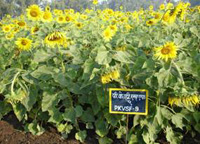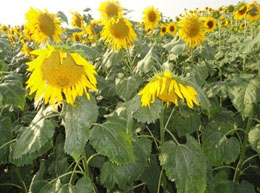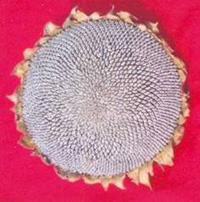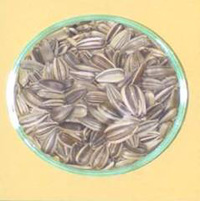AICRP on Sunflower, Akola
| About Project |  |
||
| Objectives | |||
| Research Activities and Achievements | |||
| Recommendations | |||
| Scientists | |||
| Contact Information |
About Project
All India Coordinated Research Project on sunflower is functioning at Dr. PDKV, Akola from the year 1972. Sunflower (Helianthus annuus L.) is an efficient oilseed crop with high quality edible oil and wider adaptability. The crop has great potential for diversification of major cropping systems. It is responsive to inputs and management and relatively less thermo and photo insensitivity renders sunflower an ideal crop for all seasons. However, it is noticed that there is some setback for area due to depressed market prices.
Objectives
Breeding Objectives
- To develop high yielding hybrid coupled with resistance to Alternaria blight and leaf spot.
- To develop high oil producing with quality oil hybrids.
- To select medium head types associated with a high number of self-fertile flowers.
Objective for Agronomy
- To assess site specific nutrient management practices to achieve higher input efficiency through balanced nutrient as per crop removal and soil fertility management.
- To develop best management to achieve maximum economic yield and profits through intensive crop management practices.
- To find out effective and economical weed control in sunflower.
- Higher moisture retention and slow release to over intermittent drought in kharif.
Objectives for Pathology
- To undertake survey for diseases in the region.
- To screen the entries of coordinated trials against major diseases.
- To screen the sunflower germplasm against major diseases.
- To screen the promising CMS and R lines and their progenies against sunflower necrosis virus disease.
- To know the effect of seed treatment, sprays and their combinations to manage the Alternaria leaf spot of sunflower.
- To know the seasonal incidence of major diseases on sunflower.
Objectives for Entomology
- To undertake survey and surveillance to identify insect pests and their parasitoids, predators and pathogens.
- To monitor major insect pests using pheromone traps.
- To screen germplasm against leaf hopper and thrips.
- To screen entries of Breeding trials against leaf hoppers and thrips.
- To screen entries against leaf hoppers and thrips under uniform pest nursery (UPN).
- To know relationship between pest incidence and weather parameters.
- To know the effectiveness of bio-pesticides against head borer.
- To know the effectiveness of botanicals and insecticides against mealy bug on sunflower.
Research Activities / Achievements
Crop Improvement: Release of varieties/Hybrids:
Dr. Panjabrao Deshmukh Krishi Vidyapeeth, has developed and released three open pollinated varieties in sunflower, viz., Surya (1983), PKV SF 9 (1996) and TAS 82 (2007), two hybrid, viz., PKVSH 27 (1996) and PDKV SH-952 (2016).
Images
 |
 |
 |
||
| TAS 82 | PKVSH 27 | PKV SF 9 | ||
 |
 |
 |
||
| PDKV SH 952 | Surya | Surya |
Recommendations
Recommendations passed on to the extension agencies
A. Crop Production
- Sunflower has proved a suitable crop in contingent conditions.
- Sunflower should be sown in 1st week of July, first fortnight of October and last week of January to 1st week of February during kharif, rabi and summer seasons respectively for obtaining higher yields.
- Intercropping of groundnut and sunflower in 6:2 and sunflower and red gram in 3:3 row proportion is found remunerative.
- Growing sunflower after sunflower should be avoided as it increases pest and disease complex and depletes the soil resulting in low yields.
- Spacing at 45 x 22.5 cm with one lakh plant population per hectare for variety Morden and 45 x 30 cm with seventy five thousand plant population for hybrid variety should be followed in Sunflower for higher yields.
- A dose of 40:40:0 kg NPK/ha for Morden and 60:60:0 kg NPK/ha for remaining varieties/hybrids of sunflower should be applied for optimum yields. Potash @ 40 kg/ha should be applied in deficit soils. Nitrogen should be applied in two equal splits at sowing and 35 days after sowing.
- Application of 60 kg phosphorus/ha through Single Super Phosphate at sowing time increases seed and oil yield in sunflower.
- Minimum four irrigations, each at seedling, bud, flowering and grain filling stages during rabi, are required for getting higher yields in sunflower.
- Seed soaking treatments in one litre water, 10mg IAA and 10mg NAA for 6 hrs and then drying under shed gives higher yield of sunflower.
- Application of 30 kg N and 30 kg P205/ha at sowing and three foliar sprays at 30, 40 and 50 days after sowing with Diammonium Phosphate + Urea (15 g Urea + 5 g DAP in one litre of water) increases the sunflower yield and reduces the cost on account of top dressing of fertilizers.
- For getting higher seed yield in sunflower, application of 5 t FYM (organic matter)/ha and inorganic fertilizer (40:60:40)NPK kg/ha along with 25kg sulphur/ha and sowing of seed after seed soaking treatment for overnight is recommended.
- Spraying of 0.2% Borax (2g Borax in one liter of water) at flowering initiation stage only on capitulum and recommended dose of 5t FYM/ha and 60:90:60 NPK kg/ha gave higher yield of sunflower hybrid PKVSH-27 in seed production programme.
- Sunflower stalk cutting with application of cellulatic microorganism culture alongwith dung slurry treatment application to the soil, 10 days before sowing of gram during rabi, has not observed any adverse effect on crop and increases Organic Carbon in the soil.
- For seed production of hybrid sunflower PKVSH-27 male female lines should be sown at the same day and application of 80 kg nitrogen, 120 kg Phosphorus and 60 kg Potash is recommended for getting higher yield.
- In sunflower hybrid seed production female and male lines should be sown in 3:1 row proportion with supplemented hand pollination increases 52% seed yield.
- Seed setting of sunflower increased by 30% if at flowering hand pollination practice is followed in morning hours.
- Sunflower crop requires 9-10 irrigations during summer at an interval of 10-12 days in Feb., 8-10 days in March, 6-8 days in April and 4-6 days in May depending upon soil type.
- Application of fertilizer and thinning are most important amongst improved package of practices in Sunflower.
- Application of 100% RDF + 5 t FYM/ha for soybean in kharif and application of 100% RDF for succeeding rabi sunflower increased the soybean yield (46%) and sunflower yield (29%) and system economics (B:C ratio of 2.46) in vertisols in Vidarbha region Maharashtra.
- Sowing of the hybrid LSFH 171 on ridges and furrows at 60 cm x 30 cm spacing and application of 125% RDF (100 : 75: 37.5 NPK kg/ha) is recommended for higher seed yield and economic returns in Maharashtra.
B. Plant Protection (Plant Pathology)
- Foliar diseases of sunflower caused by Alternaria, Curvularia and Bacterial leaf spot should be controlled by spraying Dithane M-45 0.25% three times at an interval of 15 days, starting first spray from the appearance of any leaf spot disease.
- Fungicidal seed dressing of Brassicol, Captan, Thirum or Bavistin @ 2 to 3 g/kg of sunflower seed was found to improve germination, plant stand and yields by protecting crop from seed and soil borne diseases.
- For controlling sunflower necrosis disease it is recommended that seed treatment with imidacloprid 5g/kg of seed before sowing and two spraying with imidacloprid 0.05% (5.0 ml in 10 litre of water) at 30 DAS and 45 DAS in crop growth period.
C. Plant Protection (Entomology)
- It is decided that Economic threshold Level for Leaf hopper on Sunflower is 3 nymphs/leaf.
- Use of nitrogenous fertilizers should be as per the recommended dose to reduce incidence of leaf hopper.
- For management of whitefly and thrips on sunflower treatment with imidacloprid 70 WS @ 5 g/kg seed OR two spraying of Azadirachtin 1500 ppm @ 20 ml / 10 lit. of water at 15 and 30 days after emergence is recommended.
Contact Information
Senior Research Scientist (Oilseeds)
Crop Research Unit (Oilseeds)
Dr. PDKV, Akola.- 444104 (M.S.)
Phone (O): 0724 2258467
Mobile : 8275286910
E-mail : srsoilseedspdkv@rediffmail.com





 Krishikosh Repository
Krishikosh Repository



